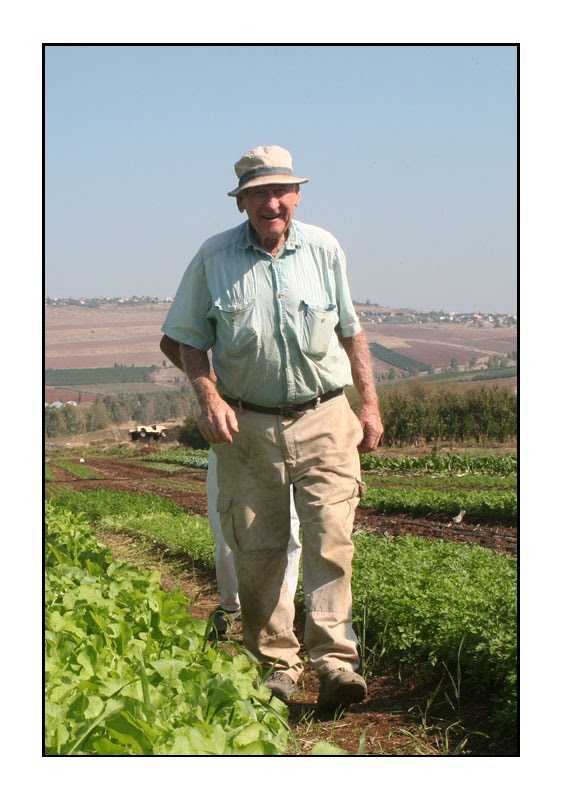On Sunday we were informed of the passing of someone very dear, Mario Levy, a man of vision, action and inspiration.

Mario was the father of Israeli organic farming, the person who sowed the seeds of the thriving organic culture in Israel with persistence, diligence and faith. He dared to dream despite the ridicule he endured, and meticulously fulfilled his ambition with accuracy, depth, knowledge and modesty.
Mario died at 94, on the Sabbath, at home on his kibbutz Sde Eliyahu in the Beit Shean Valley, where his lovingly-nurtured organic garden hosted, taught and inspired so many people.
Mario immigrated to Israel from Italy in his youth and studied at Mikveh Yisrael. In the beginning of the 1940s he joined Sde Eliyahu where he struggled to work the land in the scorching sun of the Beit Shean Valley, together with his fellow kibbutzniks. It was not easy at first, but with time they learned to produce impressive yields. Unfortunately, in the 60s, just as agriculture was starting to stabilize for them, the kibbutz farmers were plagued by the challenges of diseases, pests and other agricultural calamities. The conventional solutions at the time were merely spraying and spraying some more, substituting one pest control for another, adding fertilizers to induce growth and choosing durable species. Mario was unimpressed. It didn’t make sense to him. He was not satisfied by these feats – they seemed to him unstable, short-termed and non-sustainable.
Contrary to the advice of his farming instructors, he dared to believe in the power of the balance of nature and the potency of vigorous plants to overcome adversity. He abstained from spraying in various plots and discovered that despite the professional wisdom of the time, the beneficial insects were able to take on the pests quite effectively, and unsprayed plants thrived just beautifully.
After a trial period, Mario travelled to Switzerland where he studied organic farming and came back thrilled and enthusiastic. For their part, the Ministry of Agriculture remained unimpressed. Yet Mario decided to start out with his own plot and managed to convince the kibbutz (only the very stubborn could pull that off) to allocate 200 dunams of fields for three years for him to “play around and experiment.” The rest is history. This organic field managed to produce ten different growths in one field, from carrots to animal fodder, and was twice rewarded: the yields thrived and the farmers were happy.
Other farmers joined the effort, but the Ministry of Agriculture remained indifferent, to say the least, and the organic farmers were chiefly met with arrogant disdain instead of the enthusiastic support they longed for.
Realizing that the farmers were on their own, Mario and his colleagues established the Israel Bio-Organic Agriculture Association. In 35 years, they have grown from a handful of “crazy farmers” to hundreds of organic cultivators throughout the country, partnered with processing factories for organic products, marketers, manufacturers, researchers and consultants.

When I first set out on my life adventure – establishing Chubeza – I went to Sde Eliyahu to meet Mario. I received a warm welcome and a patient, listening ear – a 30-year-old woman coming to seek a blessing from the elderly Rabbi (he was eighty years old at the time.) I told him about my vision and plan, and he showered me with advice, professional guidance and encouragement. He was not easily moved towards enthusiastic emotion – his responses were practical and precise, emphasizing the methodical planning required and systematic implementation, specifying the many challenges and issues I must tend to before I could set my vision in motion. He promised it wouldn’t be easy, but assured me it will be very rewarding.
This was Mario, this was his outlook on organic farming and perhaps on life in general – one needs to be fully and genuinely invested, completely and genuinely, forever in sincere and unrelenting self-demand.
And in his words:
Those who deal with organic farming must know they are inseparable from the organic world. Dealing with it can positively influence human health. From the agricultural angle – organic farming proves that this is not utopia but rather sustainable farming.
For that, it is vital that we are engrossed in it; that we expand our knowledge in all that we do, seeing the broad wholeness of nature, never content with partial or temporary facts. This must be combined with simplicity and the ability to be content with little. We must live modestly and thus behave, far from external ostentation.
We can succeed in this if we champion the love of mankind, love for the other, with patience and tolerance.
Mario retired from active work in the field only a few years ago, after which – already in his very advanced years – he began touring the country, wandering among the various organic farms, big and small, visiting younger farmers (“young” being a relative concept in his case), getting to know them, advising, listening and always learning from them while he perceived the many ripples of his life-mission. Just imagine a man in his nineties, cheery and inquisitive, energetic and knowledgeable. And ever so modest and full of faith. Mario Levy.
We were fortunate to have been able to know him and learn from him. Thank you, Mario.
May his memory be blessed.
If you wish to learn more about Mario Levy, listen to his story here (Hebrew).
From all of us at Chubeza, Shavua Tov!
_______________________________________
WHAT’S IN THIS WEEK’S BOXES?
Monday: Broccoli/cabbage, carrots, fava beans/Jerusalem artichoke, cucumbers, cauliflower, tomatoes, potatoes, parsley/dill/coriander, lettuce/red lettuce, leeks/ scallions. Small boxes only: celeriac
Large box, in addition: Garden or snow peas, Swiss chard/spinach/kale, beets, radishes/turnips/daikon.
Wednesday: Broccoli/cabbage, carrots, fava beans/Jerusalem artichoke, cucumbers, cauliflower, tomatoes, potatoes, lettuce/red lettuce, radishes/turnips/daikon, garden or snow peas. Small boxes only: Swiss chard/spinach/kale.
Large box, in addition: parsley/dill/coriander, leeks/ scallions, beets, celeriac.
